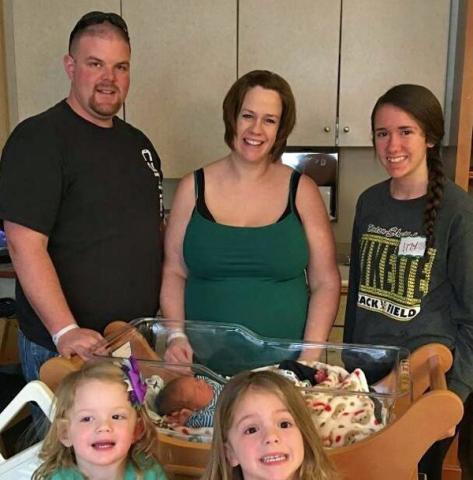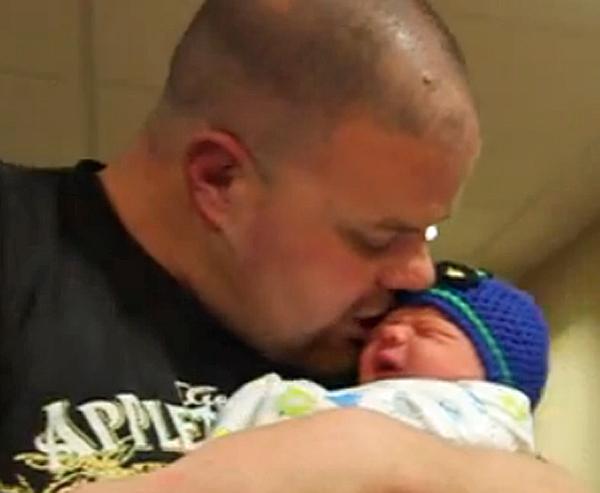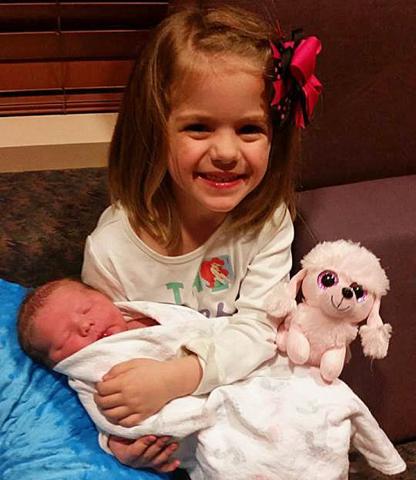Having missed her first opportunity in four years to celebrate her birthday on the date she was born, little Gia Birker will have to wait another four years, when her family can celebrate together on Feb. 29, 2020.
But she doesn’t seem to mind – at least not too much.
Born on Leap Day in 2012, Gia celebrated her 4th birthday a couple days early just in case – just in case her little brother came on her fourth birthday.
He did. Owen Mathias Birker was born at 1:15 p.m. on Monday, Feb. 29, measuring 21 inches and weighing 8.4 pounds. Owen was the second Leap Year baby born to Jeff and Leah Birker. He came home from the hospital Thursday, joining Gia and his other two older sisters, Amelia, 13; and Avia, age 2. The girls have joined their parents in showering the family’s first baby boy with love.
“Gia just loves presents and loves her brother. I don't think she's realized they share the same day,” says Leah.
The odds of having two Leap Year babies are more than two million to one (more on that later).
The unique situation that caused Gia to miss her first chance at a real celebration on her real birthday also gave the family a chance to celebrate publicly the unique birthdates of two of their children.
It was Jeff’s wish, when the couple learned they were expecting, to have a second Leap Year baby.
“Feb. 29 was the original due date when I went in July 6th to Julie Hoffman,” says Leah. Later, an OB gave her an estimated due date of March 6.
“But then I was measuring larger so they let me go back to a Leap Day induction,” Leah adds.
The Birker family was featured in the news, including on a few TV stations, celebrating their duo Leap Day babies.
“It’s better than winning the lottery,” Jeff said in an interview with the St. Luke’s Hospital Communication Specialist Sarah Corizzo. “It’s very exciting. I wouldn’t have it any other way.”
The Birker family is now complete, says Leah, although she adds that this is not the first time she and Jeff had thought that.
“Owen is our little miracle as we were done having babies,” says Leah. “We got rid of all our baby items as Jeff and I discussed waiting 3 years or so to see if we wanted a final baby.”
Last May, the couple joined Leah’s family in a weight loss challenge.
“We were walking 2-4 miles a day and eating right,” Leah says. “Jeff lost over 30 pounds and I lost 9 in the first month. Then 4th of July weekend came and I had swelling in my feet, which didn't make much sense because our bodies were used to walking. So I starting taking water pills. On July 6, I went to talk to Dr. Julie Hoffman and see why I was swelling. And they said they were going to run some tests on me but I'm pretty young to have thyroid trouble.”
“Two minutes later Dana the medical tech walked in and said, ‘Congrats, you’re pregnant!’ I was shocked, excited – and for sure very surprised,” Leah recalls.
Gia is not quite old enough to understand that she and her brother will share a birthday. And she is young enough to get mad when her older sister says, “It’s only your first birthday.”
Someday, said Leah, Gia will learn to claim the youth that more mature Leap Year babies like to brag about when their number of actual birthdays is ¼ that of their friends.
But for now, all that matters to her is that new little brother
Leap Year odds and Leap Year history
How rare are Leap Year siblings?
The Birkers learned that the odds are more than two million to one of having two babies born on leap year.
It’s easy for mathematicians to determine the odds of a Leap Year baby, using the year-to-year calendar.
The exact odds, however, depend on how precise one wants to be about Leap Year Days. Leap Year almost always comes every four years, but there are only 97 Leap Days in 400 years. (See more information on that in the links below.
The simplest math says that Leap Day happens every four years, or 1,461 days (365 days per year, times four, plus 1 for the Leap Day). Thus the odds of any baby being born on Leap Day is 1 in 1461. To determine the odds of that any two people are born on Leap Day, one must multiply that number by itself. (1461 X 1461 = 2,134,521). But when you factor in the years that were not leap years (most recently 1800 and 1900), the long-term odds are even higher.
But still, one in two million is very rare – rare enough that many families with two Leap Day babies receive recognition in the news. A few other American families were featured in news stories this week for having a second Leap Day baby. A mother in England who was a Leap Day baby gave birth on Feb. 29.
And there is one family in Europe with three Leap Day babies.
The odds of that happening are 3,118,535,181 to one.
The St. Luke’s PR person asked Jeff if that was likely for the Birker family.
No, he replied. We’re done.
He has, however, said that before.
Pope Gregory and the first Leap Year, 1582



Comments
Submit a CommentPlease refresh the page to leave Comment.
Still seeing this message? Press Ctrl + F5 to do a "Hard Refresh".